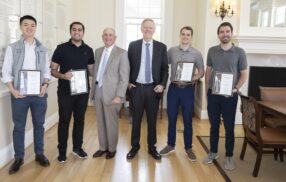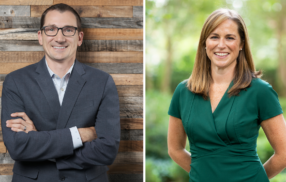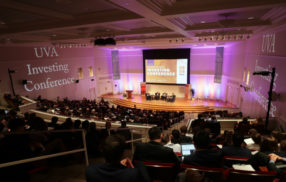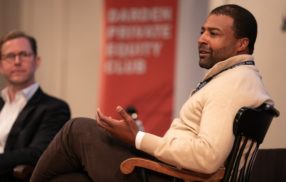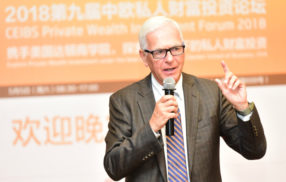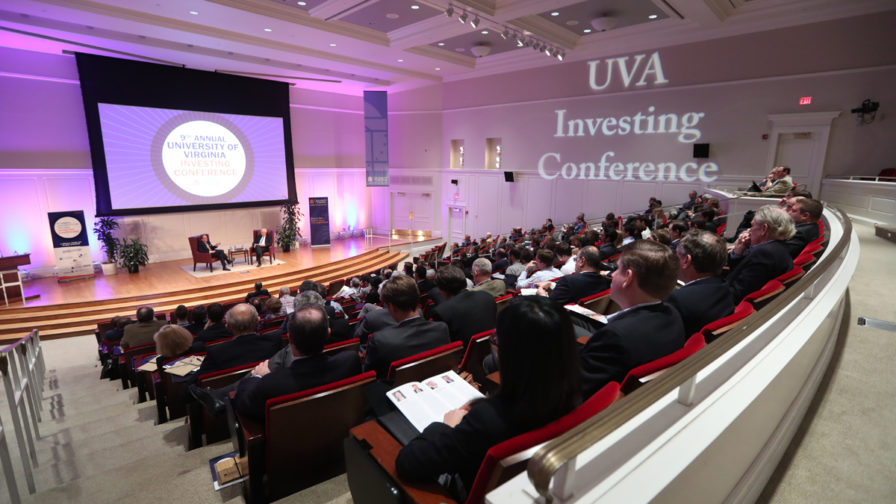
UVA Darden Finance and Investing Spotlight: People to Know, Events to Attend, Recession Odds to Handicap
By Jay Hodgkins
The 11th annual University of Virginia Investing Conference (UVIC) is approaching. On 7–8 November, the Darden School of Business will once again host the summit of industry experts and academics who will this year share insights and predictions on the future of “alpha” — an investment strategy’s ability to beat the market.
Barbara Novick, co-founder and vice chair of BlackRock; Henry McVey, CIO of KKR Balance Sheet at KKR; and John Chisholm, co-CEO of Acadian Asset Management, are just a few of the speakers headlining the conference.
To get ready for the insights and discussion the conference will produce about the outlook for investing, the global economy and geopolitical turbulence impacting markets, Darden offers this finance and investing primer looking back at key takeaways from the 2018 conference as well as insights from recent speakers and events at the School.
‘Crises Will Occur Again’
On the 10-year anniversary of the global financial crisis, the 2018 UVIC explored three critical questions:
- What have we learned from the crisis in the 10 years since?
- What have we fixed?
- What remains to be done?
It kicked off with an oral history of the crisis featuring former Fannie Mae Chair and CEO Franklin Raines, former Citigroup CFO and Vice Chair Ned Kelly and former AIG Chief Compliance Officer Stasia Kelly, each of whom found themselves on the frontlines of the response to the crisis.
Kelly summarized the role business leaders must take to do their part guiding their companies away from the risk-taking and unethical decision-making that fed into the crisis: “Organizations need a commitment to do the right thing from the top. When a CEO articulates his belief that people need to behave a certain way and in accordance with the rule of law, that goes all the way down through the organization. When a CEO only pays lip service, that also goes all the way through the organization.”
Looking at the state of banking in 2018 following a slew of post-crisis regulations, former Citigroup Chairman Michael O’Neill (MBA ’74) said his imperatives during the crisis as leader of the board were to centralize and strengthen the bank’s risk management and recruit board members who were true subject matter experts in the bank’s areas of business.
Head of Richmond Fed Shares Economic Outlook
Federal Reserve Bank of Richmond President and CEO Tom Barkin delivered a Leadership Speaker Series keynote address at Darden on 3 October, offering his thoughts on a range of topics, from global trade to a potential U.S. recession.
On the prospect for recession:
“What I focus on is confidence. Consumer confidence and business confidence. Consumers are 68 percent of the economy. As I said earlier, all this uncertainty — political, geopolitical, the Middle East, Brexit — is causing [businesses] to take a step back. So you’ll see the investment side of the economy, manufacturing, that is clearly flattening. On the positive side, rates are down and autos and residential are clearly strong. … We’ll see in two weeks the retail sales report and in four weeks the consumer spending report. If you see that bouncing back then I don’t worry about recession as long as consumers spend.”
On the impact of trade wars on the U.S. and global economies:
“The international economies are very weak and I think they are very weak in part because of what’s happening in trade. Where it hits the U.S. economy is uncertainty. I’d put it like this: I’m a business person, I’m running my company and I’m trying to think about growth. How do I decide to grow if I don’t know what the rules are going to be? … It really is stifling investment, in my opinion.”
What Recession? Bright Economy Drives Strong Finance and Investing Hiring Trends
The financial services industry, from investment banks to asset managers, continue to compete in a hot job market for talent from top MBA programs.
More than 24 percent of Darden’s full-time MBA Class of 2019 took a role in financial services, with a mean base salary of $135,278. JPMorgan Chase was the top hiring company in the industry, bringing on eight new Darden grads.
The Darden Career Development Center ensures students have a number of opportunities to get their foot in the door with top finance companies each year, from a well-structured recruiting process on Grounds for banking careers to job treks to destinations such as New York City for the School’s annual Week on Wall Street; Charlotte, North Carolina; and Boston. These treks to finance hot beds give students a firsthand look inside a variety of organizations and allow them to establish a network in fields with a less defined recruiting process such as private equity, venture capital and other areas of asset management.
The University of Virginia Darden School of Business prepares responsible global leaders through unparalleled transformational learning experiences. Darden’s graduate degree programs (MBA, MSBA and Ph.D.) and Executive Education & Lifelong Learning programs offered by the Darden School Foundation set the stage for a lifetime of career advancement and impact. Darden’s top-ranked faculty, renowned for teaching excellence, inspires and shapes modern business leadership worldwide through research, thought leadership and business publishing. Darden has Grounds in Charlottesville, Virginia, and the Washington, D.C., area and a global community that includes 18,000 alumni in 90 countries. Darden was established in 1955 at the University of Virginia, a top public university founded by Thomas Jefferson in 1819 in Charlottesville, Virginia.
Press Contact
Molly Mitchell
Associate Director of Content Marketing and Social Media
Darden School of Business
University of Virginia
MitchellM@darden.virginia.edu



